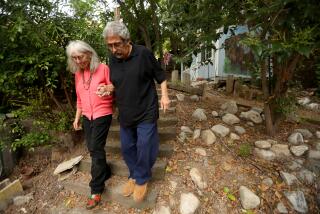Alzheimer’s Other Prisoners : Families: The afflicted aren’t the only ones who suffer from Alzheimer’s. Care-givers, one author says, must learn to lead as normal a life as possible.
- Share via
For those who take care of the millions of Alzheimer’s patients, life is not normal.
But people who care for loved ones with Alzheimer’s disease have to try to make it so, says Sharon Fish, even when the disease forces a very different definition of normal.
It’s better to go out to eat now and then, even though you have to spoon-feed your loved one in the restaurant, than to feel as if you are trapped in the house, Fish says.
It’s better to hire a person to sit up in your house each night to guard against an Alzheimer’s patient’s wanderings than to be fatigued from lack of sleep.
Fish, a nurse and a writer, has a mother with Alzheimer’s disease. For 10 years, Fish has been taking care of her; her experiences led to her book, “Alzheimer’s: Caring for Your Loved One, Caring for Yourself.”
Caring for an Alzheimer’s patient is bound to be exhausting. It’s essential that care-givers maintain normal activities and have time away from the loved one, Fish says. But too often, the behaviors that can characterize Alzheimer’s lead to greater isolation.
For example, catastrophic reactions: When faced with frustration or too much stimulation, Alzheimer’s patients can suddenly react with anxiety, abusiveness or even violent physical or verbal outbursts.
One care-giver told Fish of her father’s inability to decide what to eat at a restaurant.
“I was trying to make him feel better about himself, so I would always ask him to choose what he wanted to eat; I wanted to give him a choice. But instead of feeling better, he became frustrated and upset because there were too many things to choose from. He couldn’t process all that information, and once he even started to cry,” she said.
Such an experience might make it seem better just to stay at home; who needs the pain? But it’s important that both the patient and the care-giver remain part of mainstream life, Fish says.
Techniques for making such reactions less difficult include:
* Avoiding situations that might trigger them, such as a crowded, bustling store;
* Making life as predictable as possible;
* Limiting choices;
* Simplifying the activities of daily life, such as using clothing with zippers instead of buttons;
* Not arguing with the patient or trying to reason with him or her;
* Reacting in a calm way, using a soft voice.
And, Fish advises, “avoid emotionally distancing yourself. Reach out with a warm embrace, a kiss, a touch of your hand. Affection can often defuse a difficult situation.”
While it’s obvious that getting out of the house benefits a care-giver, it may not be so clear that it’s good for the patient. But, says Fish, “always assume more understanding and comprehension than you actually see.”
Fish, for example, takes her mother to church on Sundays and on visits to friends’ homes. A year ago, she couldn’t: Her mother would wander off. But now her mother has declined further and is confined to a wheelchair. It’s much easier to take her, and Fish is convinced her mother gets something out of it.
“We go to friends’ homes for dinner,” Fish says. “People need to know they’re still part of the family.”
It’s essential that care-givers have time away from their responsibilities, Fish says. Too often, home health aides are hired to stay with the patient while a care-giver goes to work or does errands, but not for the care-giver to have time for other activities.
It’s great for a care-giver to go to the movies, play golf or do whatever else he or she likes. But perhaps some of the best-spent time away from home is in a support group, Fish says.
“If a person doesn’t have a support system, their emotions get quite out of control,” she says.
Her 10 years of care-giving to her ever-deteriorating mother have not been entirely negative, she says. “I was always real close to my mother. But the feeling now is much deeper--I’ve mellowed out. I’ve learned a lot in relation to patience.”






